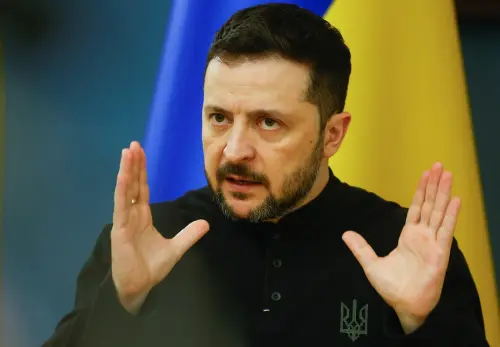Ukrainian President Volodymyr Zelenskiy announced that a ceasefire covering the Black Sea and energy strikes took effect immediately, but cautioned that Moscow was already manipulating and misrepresenting the agreements.
He plans to request U.S. President Donald Trump supply weapons and impose sanctions on Russia should Moscow violate the accords.
The United States previously indicated it had reached separate agreements with Kyiv and Moscow to ensure safe navigation in the Black Sea and to enforce a ban on attacks against energy facilities in both countries.
Zelenskiy stated, "The U.S. side considers that our agreements come into force after their announcement," expressing distrust in Russia’s commitment to uphold the arrangements.
In a subsequent video address, he asserted that Russia was already deceiving the international community. "Unfortunately, even now, even today, on the very day of negotiations, we see how the Russians have already begun to manipulate. They are already trying to distort agreements and, in fact, deceive both our intermediaries and the entire world."
He refuted Kremlin claims linking accords on Black Sea shipping to sanctions against Moscow, emphasizing that Ukraine would do everything possible to uphold the agreements, but warned that Russia would face a "strong response" if it conducted strikes.
These accords mark the first effort to halt energy strikes since Russia's full-scale invasion began in February 2022, which has sparked Europe’s largest conflict since World War II. The fighting continues along a 1,000-kilometer front line.
In remarks to reporters, Zelenskiy noted that the agreements outlined no specific actions in the event of a Russian breach, leading him to consider appealing to Trump if such a situation arose. "We have no faith in the Russians, but we will be constructive," he said.
He indicated that U.S. officials viewed the energy ceasefire as applicable to other civilian infrastructure and that the Black Sea agreement should encompass port activities.
Russian drone attacks have plagued major Ukrainian cities for months, alongside missile strikes that have severely impacted the power grid. In response, Kyiv has targeted Russian oil refineries using drone strikes to escalate costs for its adversary.
During discussions, Ukraine provided U.S. officials with a list of facilities that should be included under the moratorium on energy strikes. The Kremlin also released a list of both Russian and Ukrainian sites affected by the ceasefire, including oil refineries, oil and gas pipelines, and nuclear power plants.
The deals were disclosed after two days of negotiations in Saudi Arabia involving U.S. and Ukrainian officials, as well as U.S. and Russian representatives.
The White House stated in a joint announcement with Russia that it would aid in restoring Moscow's access to global agricultural and fertilizer markets. However, Zelenskiy noted that Ukraine had not agreed to this inclusion in the U.S. statement, asserting, "We believe that this is a weakening of position and sanctions."
Ukrainian Defence Minister Rustem Umerov indicated that any movement of Russian naval vessels beyond the eastern Black Sea would be seen as a violation of the agreements, granting Kyiv the right to self-defense and potential retaliation.
Kyiv, which has utilized naval drones and missiles to push the Russian fleet further east, welcomes support from third countries in implementing the accords, Umerov added.
Zelenskiy commented on the American side's desire for success, stating, "The American side really wanted all of this not to fail, so they did not want to go into many details. But in any case we will have to understand answers to each of the details."
He mentioned the potential involvement of Turkey in monitoring the Black Sea, while Middle Eastern countries could track the energy ceasefire, although discussions with those nations had yet to take place.
Separately, Zelenskiy revealed that the United States had offered an expanded version of a bilateral minerals deal that advanced beyond the initial framework agreement that was agreed upon earlier but never signed after a contentious meeting in the Oval Office last month. He admitted he had not yet fully reviewed the new proposal but noted it did not include increased U.S. participation in Ukraine's nuclear power sector, which had been suggested by Washington in recent discussions.
